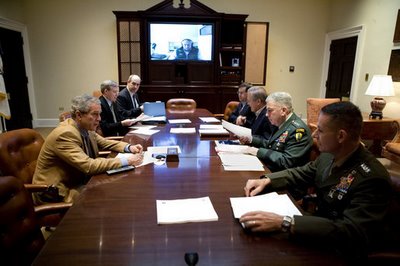"The center of Beirut was packed Sunday with hundreds of thousands of pro-Hezbollah and allied demonstrators who, in a jubilant mass of protest and carnival, pressed their call for the government to resign.
. . . Over and over, the crowd, the speakers and the posters offered clear explanations. They did not want a government controlled by the so-called March 14 coalition, an amalgam of Sunni, Christian and Druse parties. They did not want a government aligned with Washington. In short, a very large number of Lebanese citizens said they did not want the present leadership.
. . . Hezbollah and its allies have managed for 10 days to control the center of Beirut with a loud, peaceful, organized protest. In many ways, Hezbollah has adopted a strategy that has been cheered by the White House in the past, in places like Ukraine, and even Lebanon, leaning on large, peaceful crowds to force unpopular governments to resign and pave the way for elections.
But this time Washington and its allies have said the protest amounts to a coup d’état, fueling charges that the United States supports democratic practices only when its allies are winning."
[1]"In some ways, Hossam Yassine represents the changing fortunes of Lebanon's Shiites. Yassine is college-educated, back from a job in the Persian Gulf. And every day this week, he has gone to the festival-like protests, in part for the party, in part because Hezbollah wants him to and in part because he believes.
"Hezbollah came and made something for the Shia, that we are here," the 22-year-old said.
. . . In a way, the protests . . . are the equivalent of a new kind of politics in Lebanon, drawing on the street, roiled by populist demands: a protest over government corruption, a denunciation of the United States and Israel, a celebration of the war this summer, tinted with a sense of betrayal at the hands of other Lebanese, and a call for change, however ill-defined it might be.
. . . "From the beginning we weren't treated well. Not just now. From the previous government and the government before that," Yassine said. "The people aren't going here because what Sayyid Hasan said. Sure, they'll do what he says. They love him. But they're going here because they're unhappy. I'll go not one night, two nights or three nights. I'll go for a year or two years."
. . . "They can't let any fight get big," Yassine said. "If a small fight gets big, Lebanon is gone."
[2]sources[1] The New York Times. As Crowd Demands Change, Lebanese Premier Is Puzzled. December 11, 2006.[2] The Washington Post. Lebanon's Shiites Grapple With New Feeling of Power. December 10, 2006.posted: thursday, december 14, 2006, 5:49 PM ETupdate: thursday, december 14, 2006, 5:52 PM ETLabels: hezbollah, lebanon, shiite

